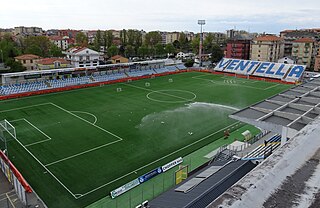Related Research Articles
Nicla Vassallo, is an Italian analytic philosopher with research and teaching interests in epistemology, philosophy of knowledge, theoretical philosophy, as well as gender studies and feminist epistemology. She is currently a Full Professor in the Department of Philosophy at the University of Genoa, a Research Associate of National Research Council, and on List of alumni of King's College London. She also is a poet and lives in Rome.
Adriana Monti is an Italian-Canadian film director, independent producer, and screenwriter. She is known for making feminist films. Her films include Scuola senza fine (1983), Filo a catena (1986) and Gentili signore (1989).

Maria Giulia Confalonieri is an Italian track and road racing cyclist, who currently rides for UCI Women's World Tour Team Uno-X Pro Cycling. She previously rode for UCI Women's Continental Team Ceratizit–WNT Pro Cycling.

Beatrice Monroy is an Italian writer and dramatist.
Noi donne is a monthly feminist magazine published in Rome, Italy. It is one of the most significant feminist publications in the country.
Giuliana Bruno is a scholar of visual art and media. She is currently the Emmet Blakeney Gleason Professor of Visual and Environmental Studies at Harvard University. She is internationally known as the author of numerous influential books and articles on art, architecture, film, and visual culture.

Valcar–Travel & Service is a professional road bicycle racing women's team which participates in elite women's races.
Emma Baeri is a Sicilian feminist historian and essayist. She has played an active role in organizing feminist political action and literary life in Italy along with her academic career.
Maria Messina was an Italian writer.

Margherita Ancona was an Italian teacher and active in the women's suffrage movement in Milan. She was the secretary and later president of the radical bourgeois Comitato lombardo pro suffragio and member of the Italian branch of the International Woman Suffrage Alliance (IWSA). One of the leaders of the Italian women's suffrage campaigns, she was the only Italian woman to serve in her era on the board of the IWSA and was as a delegate to the Inter-Allied Women's Conference of 1919.
Graziella Sonnino Carpi was an Italian feminist and peace activist in the interwar period. She was a member of the Italian Unione Femminile Nazionale and a delegate to the 1919 Women's Conference.
Maria Rosa Cutrufelli is an Italian writer and journalist.

Luciana Percovich is an Italian non-fiction writer, a teacher, a translator and director of a series of books on women's history and spirituality. She was born in Gorizia, Italy in a Mitteleuropean Italian speaking family forced to leave Fiume, Rijeka at the end of World War II, with cultural and geographical roots in Austria and Dalmatia, she spent her childhood and adolescence in Gorizia attending Classical studies. At the age of 18, she went to Milan to complete her education, and there she graduated in 1972. She has been defined as "a traveller between worlds and a weaver of space-time connections for her ability of embracing distant wide horizons with a loving insight".
Whatever I've done, it's been conceived within women's relations, in presence of women's bodies and in the flowing of awakened women's emotions.
Lea Vergine, born Lea Buoncristiano, was an Italian art critic, essayist, and curator.
The Rivolta Femminile refers to: the first female-only feminist group, created in Rome in 1970 with a meeting between Carla Lonzi, Carla Accardi, and Elvira Banotti; the manifesto they developed, which appeared on the walls of Rome in July 1970, is "The Manifesto of Female Revolt"; the "Women's Revolt" publishing house, founded in 1970 in Milan by Carla Lonzi, through it the writings of the group were published.

The 2020 Supercoppa Italiana was the 24th edition of the Supercoppa Italiana.

Marcella Campagnano is a contemporary artist and Italian feminist photographer. She lives and works in Como. Using self-portraits, Campagnano documents gender assignments imposed on women.
Lea Melandri is an Italian feminist scholar, journalist and writer. She is one of the leading feminists in Italy and is part of the second-wave feminist movement. She has established various magazines and published books on feminist theory.
Genre et transgressions: Représentation, agentivité, autodétermination is a collective work edited by Azadeh Kian, Tiziano Peccia, and Anastasia-Athénaïs Porret. This publication addresses the complex notion of transgression and its implications for women across diverse national contexts.
References
- 1 2 3 4 "Lista dei periodici" (in Italian). Fondazione Gramsci Emilia-Romagna.
- 1 2 "Lapis Percorsi della riflessione femminile" (in Italian). Biblioteca delle Donne. Retrieved 21 September 2021.
- ↑ Giovanni Zaccherini (5 August 2016). "Amore e violenza". Wall Street Magazine (in Italian). Retrieved 21 September 2021.
- ↑ Elena Vacchelli (2014). "Gender and the city: intergenerational spatial practices and women's collective action in Milan". Les Cahiers du CEDREF (21). doi:10.4000/cedref.1001.
- 1 2 Maria Ines Bonatti (1997). "Feminist periodicals 1970-". In Rinaldina Russell (ed.). The Feminist Encyclopedia of Italian Literature. Westport, Connecticut; London: Greenwood Press. pp. 103–105. ISBN 978-0313294358.
- ↑ "Feminist Duration Reading Group: Lea Melandri, Love and Violence". Space Studios. 6 March 2018. Retrieved 21 September 2021.
- ↑ Franca Fossati (Spring 1994). "A new phase of reconstruction". Connexions (in Italian) (45): 16–19.
- ↑ Federica Perinzano (17 May 2021). "Questo corpo". Nido. Retrieved 21 September 2021.
- 1 2 Giuliana Bruno (1989). "The Image (and the) Movement: An Overview of Italian Feminist Research". Camera Obscura . 7 (2–3): 31, 37. doi:10.1215/02705346-7-2-3_20-21-28.
- ↑ Francesca Sensini (2022). "Quand la trace écrite dessine le parcours de l'autonomie: l'expérience de la revue Lapis". Laboratoire italien (in French) (28). doi: 10.4000/laboratoireitalien.8269 .